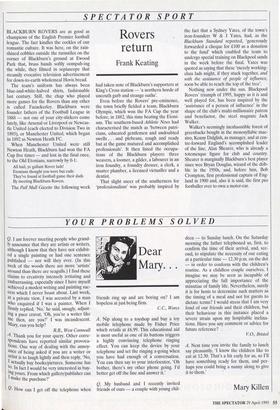SPECTATOR SPORT
Rovers return
Frank Keating
BLACKBURN ROVERS are as good as champions of the English Premier football league. The fact kindles the cockles of our romantic culture. It was here, on the rain- shined cobbles outside the turnstiles on the corner of Blackburn's ground at Ewood Park that, brass bands softly oompah-ing the while, they filmed in sepiascope that steamily evocative television advertisement for down-to-earth wholemeal Hovis bread.
The team's uniform has always been blue-and-white-halved shirts, fashionable last century. Still, the chap who played more games for the Rovers than any other is called Fazackerley. Blackburn were founder fathers of the Football League in 1888 — not one of your city-slickers come lately, like Arsenal or Liverpool or Newcas- tle United (each elected to Division Two in 1893), or Manchester United, which began in 1892 as Newton Heath FC.
When Manchester United were still Newton Heath, Blackburn had won the FA Cup five times — and lost in the final once, to the Old Etonians, narrowly by 0-1: All hail, ye gallant Rover lads!
Etonians thought you were but cads: They've found at football game their dads By meeting Blackburn Rovers.
The Pall Mall Gazette the following week had taken note of Blackburn's supporters at King's Cross station — 'a northern horde of uncouth garb and strange oaths'.
Even before the Rovers' pre-eminence, the town briefly fielded a team, Blackburn Olympic, which won the FA Cup the year before, in 1882, this time beating the Etoni- ans. The southern-based Athletic News had characterised the match as 'between patri- cians, educated gentlemen and undoubted swells . . . and plebeans, rough and ready but at the game matured and accomplished professionals'. It then listed the occupa- tions of the Blackburn players: three weavers, a loomer, a gilder, a labourer in an iron foundry, a foundry dresser, a clerk, a master plumber, a licensed victualler and a dentist.
That slight sneer of the southerners for `professionalism' was probably inspired by the fact that a Sydney Yates, of the town's iron-founders W & J Yates, had, as the Blackburn Standard reported, 'generously forwarded a cheque for £100 as a donation to the fund' which enabled the team to undergo special training on Blackpool sands in the week before the final. Yates was quoted as saying that these 'merely working- class lads might, if they stuck together, and with the assistance of people of influence, soon be able to reach the top of the tree'.
Nothing new under the sun. Blackpool Rovers' triumph of 1995, happy as it is and well played for, has been inspired by the `assistance of a person of influence' in the shape of the club's multi-millionaire patron and benefactor, the steel magnate Jack Walker.
Walker's seemingly inexhaustible forest of greenbacks bought in the monosyllabic mae- stro, Kenny Dalglish, as manager, and at cen- tre-forward England's accomplished leader of the line, Alan Shearer, who is already a totemesque figure for club and country. Shearer is marginally Blackburn's best player since wee Bryan Douglas, wizard of the drib- ble in the 1950s, and, before him, Bob Crompton, first professional captain of Eng- land in 1900 and, also it is said, the first pro footballer ever to own a motor-car.


























































 Previous page
Previous page